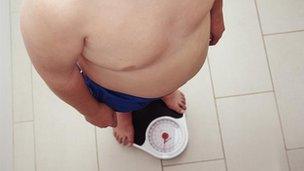Obesity review means more in Wales could have surgery
- Published

About 57% of Welsh adults are overweight or obese
A review is examining if weight loss surgery should be offered to greater numbers of obese people in Wales.
Welsh ministers are awaiting a report into criteria deciding who is eligible for operations which could mean surgery is available for the less obese.
The review is also considering the cost to the NHS of changing guidelines.
One surgeon said Wales should eventually lower the threshold at which people qualify for NHS-funded surgery, as recommended by a health watchdog.
In Wales the threshold is set for patients with a BMI, or body mass index, of 50. Patients must also have either severe and uncontrolled high blood pressure, sleep apnoea or diabetes.
The National Institute for Health and Clinical Excellence (Nice) says the NHS in Wales and England and Wales should offer so-called bariatric surgery, such as gastric sleeves and bypasses, to people with a BMI of 40.
It also recommends surgery for people with a BMI of 35 if they have other health problems, such as diabetes or high blood pressure.
An independent committee that plans specialist treatments for the NHS in Wales is reviewing the policy.
The Welsh Health Specialised Services Committee is expected to deliver its findings to Health Minister Lesley Griffiths by the end of the month.
Calculate your BMI

Clinical assessments of who is suitable for surgery are made by a multi-disciplinary panel based at Morriston Hospital in Swansea.
Jonathan Barry, a consultant surgeon at the Welsh Institute of Metabolic and Obesity Surgery at Morriston Hospital, Swansea, said the Nice guidelines were the "gold standard" and adopting them too quickly could "open up the floodgates".
"In our first year/15 months of activity we had 1,000 referrals from all over Wales, of which we were eligible to operate on 67," he said.
Scott Caplin a consultant surgeon at the Welsh Institute of Metabolic and Obesity Surgery at Swansea's Morriston Hospital
"A staggering proportion of those patients are Nice compliant."
He said procedures such as gastric sleeves can pay for themselves within two-and-a-half years by allowing patients to come off other forms of medication.
He added: "What we should be doing is aggressively going after the younger, not as obese [with] early on-set diabetes.
"At the moment all we are doing is operating on people for whom the benefit is not as great."
Last year 57% of adults in Wales were classified as overweight or obese and 22% were obese.
BMI is calculated by dividing your weight in kilograms by your height in metres squared: for example, 80 kg divided by (1.75m x 1.75m).
A BMI of less than 18.5 is underweight, 18.5-25 is ideal, 25-30 is overweight, and 30 or above is obese.
Interpretation of the figures varies for people depending on ethnic origin, if they are going through puberty, or if they are particularly muscular.
In a written statement, Mrs Griffiths said the trend and prevalence of people with "excess weight are still unacceptably high".
"We need to keep the momentum going to prevent adults and children facing deteriorating health and a lower quality of life and we are facing spiralling health and social care costs," she said
The review is assessing the health outcomes and costs to NHS Wales of adopting the Nice guidance. It applies to people who have failed to lose weight while getting medical help.
Mrs Griffiths said the Welsh criteria were designed to focus "scarce resources" on the people most at risk.
She said only a small proportion of patients referred for treatment go through with the surgery. About 40% drop out when the complications are explained to them.
Mrs Griffiths said she would make another statement in January after receiving the review.
- Published12 July 2012
- Published31 August 2012
- Published15 July 2012
- Published9 August 2012
- Published31 March 2011